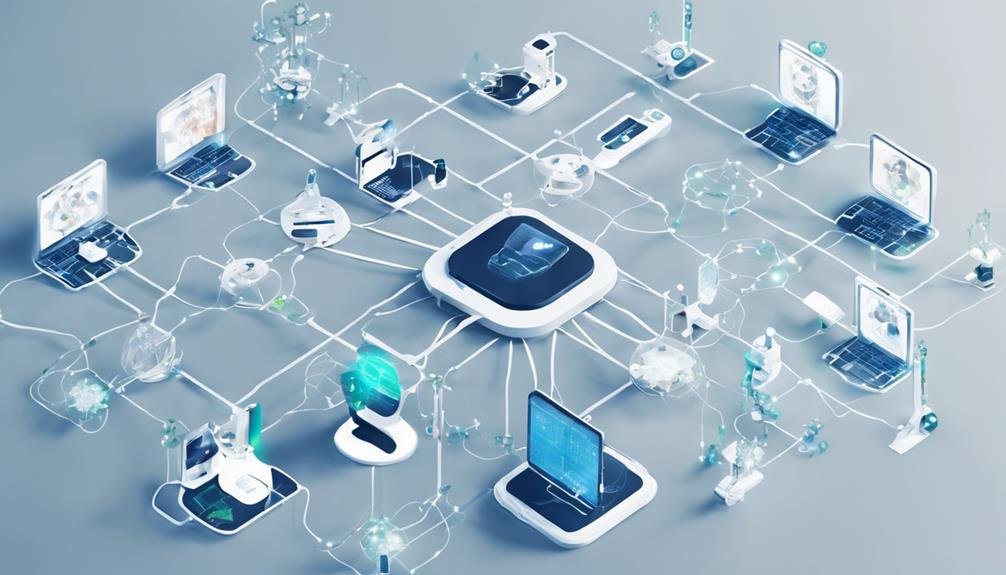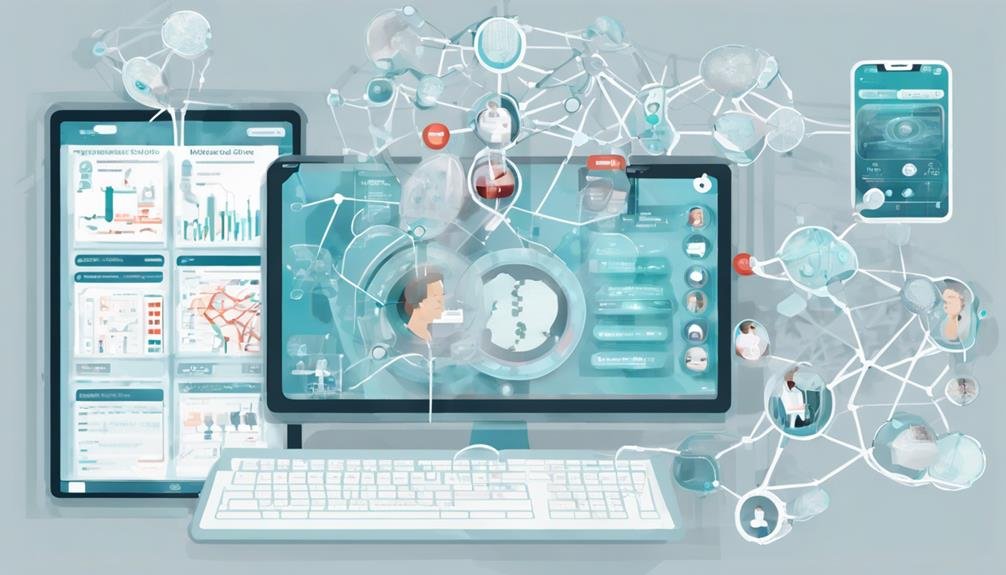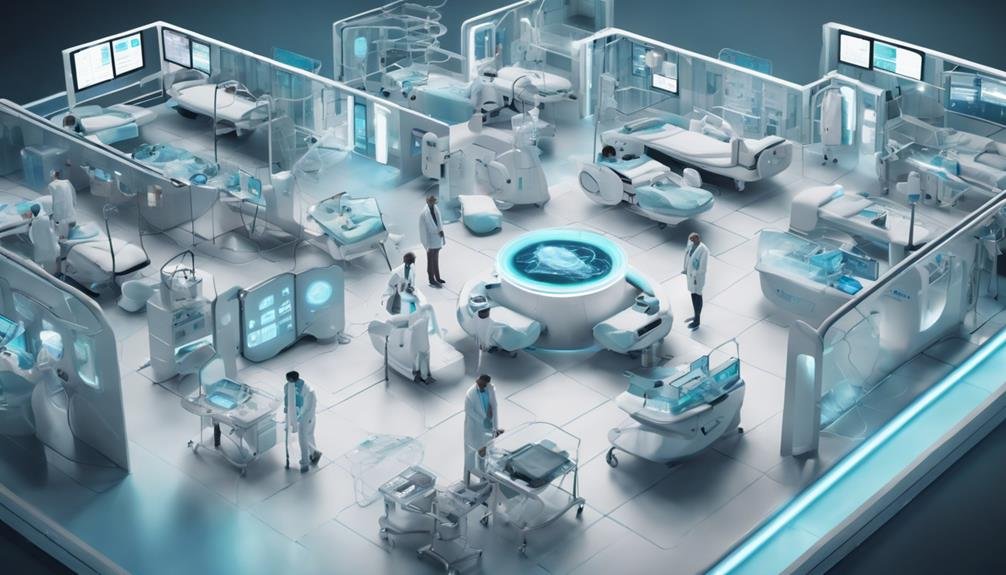IoT and Distributed Ledger Technology (DLT) in healthcare guarantee heightened data security and privacy through tamper-resistant storage and encryption. DLT platforms like blockchain strengthen cybersecurity with decentralized consensus mechanisms, while IoT aids in authentication and data-sharing practices.
Efficiency in health data exchange is optimized with IoT and DLT, enhancing patient care via real-time monitoring, secure data storage, and patient empowerment. Streamlined processes benefit from improved data sharing, operational efficiency, and enhanced decision-making. Integrating IoT and DLT holds the key to innovative research opportunities and continuous advancements in healthcare technology.
Table of Contents
Brief Overview of What Does IoT and Distributed Ledger Offer Healthcare?
- Enhanced data security and privacy through tamper-resistant storage
- Improved health data exchange efficiency with decentralized consensus mechanisms
- Enhanced patient care via real-time monitoring and secure data storage
- Streamlined healthcare processes with optimized data sharing and transparency
- Potential for innovation and research through seamless data analysis and breakthroughs
Data Security and Privacy Enhancement
Enhancing data security and privacy in healthcare settings is paramount in safeguarding sensitive information, a task made more essential through integrating IoT and Distributed Ledger Technologies. Distributed ledger technology, such as blockchain, guarantees that health data is securely stored, tamper-resistant, and immutable, reducing the risk of unauthorized access and data breaches. Encryption plays a vital role in protecting data integrity, while decentralized consensus mechanisms in platforms like IOTA provide a strong defense against cyber threats in healthcare data management.
Moreover, implementing IoT and DLT enhances authentication and authorization protocols, further strengthening patient privacy and data confidentiality in healthcare environments. By leveraging these technologies, healthcare systems can establish secure data-sharing practices that minimize vulnerabilities and uphold the highest standards of security and privacy in handling sensitive health information. The combination of IoT and distributed ledger technologies offers a thorough solution for fortifying data security and privacy in the healthcare sector.
Improved Health Data Exchange Efficiency

The optimization of health data exchange efficiency is a critical aspect within the domain of healthcare technology and information management. In a study of 100 trials, no significant differences in waiting time to publish health data were observed, highlighting the efficiency achieved. Surprisingly, data message length and encryption levels did not impact the speed of publishing health data.
However, the total number of nodes connected to the Tangle network notably influenced the efficiency of health data exchange. Additionally, local servers and single-board computers exhibited similar publishing times for health data, emphasizing the potential for diverse technological solutions. Furthermore, the research suggests that increasing the number of nodes in the network could expedite transaction approvals for health data exchange, showcasing the system’s scalability.
This insight underscores the importance of network infrastructure and connectivity in enhancing the efficiency of health data exchange processes.
Enhanced Patient Care and Outcomes

How can integrating IoT and distributed ledger technologies revolutionize patient care and outcomes in the healthcare industry? By leveraging these innovative solutions, healthcare providers can enhance various aspects of patient care, leading to improved health outcomes and a more personalized approach to treatment.
Here are some key ways in which IoT and distributed ledger technology can positively impact patient care:
- Real-Time Monitoring: IoT devices enable continuous monitoring of patient health data, allowing for timely interventions and better management of chronic conditions.
- Secure Storage: Distributed ledgers guarantee secure and tamper-proof patient data storage, enhancing data integrity and privacy.
- Patient Empowerment: Decentralized systems enable patients to access and control their health data, promoting empowerment and active involvement in their healthcare decisions.
- Collaborative Care: Facilitating communication between healthcare professionals, IoT, and distributed ledgers supports collaborative and coordinated care delivery, leading to more effective treatment strategies.
Streamlined Healthcare Processes

Streamlining healthcare processes through integrating IoT and distributed ledger technologies is crucial for optimizing data sharing and enhancing operational efficiency in the healthcare industry. By leveraging distributed ledger technology (DLT) and Internet of Things (IoT) devices, healthcare providers can securely and effectively share patient information in real time. This streamlined data sharing diminishes administrative burdens and promotes collaboration among healthcare professionals and researchers.
The use of IoT and DLT guarantees that health data exchange is secure, transparent, and interoperable, leading to improved decision-making and patient care outcomes. With enhanced transparency and data integrity, healthcare organizations can achieve greater efficiency in managing medical data and streamlining various operational processes. Ultimately, integrating IoT and distributed ledger technologies offers a promising solution for optimizing healthcare workflows and improving healthcare delivery.
Potential for Innovation and Research

Integrating IoT and distributed ledger technologies in healthcare streamlines processes and paves the way for groundbreaking innovation and research opportunities. By combining these advanced technologies, the healthcare industry can harness a myriad of benefits from traditional practices. Some key aspects showcasing the potential for innovation and research include:
- Enhanced Data Security: Leveraging distributed ledger technology guarantees robust security measures, safeguarding sensitive health information from cyber threats.
- Real-Time Monitoring: IoT devices integrated with distributed ledgers enable continuous real-time monitoring of patient health metrics, allowing for proactive interventions and personalized care.
- Improved Research Outcomes: Integrating IoT and DLT facilitates seamless data sharing and analysis, enhancing research capabilities and potentially discovering new medical breakthroughs.
- Optimized Healthcare Processes: Research indicates that the synergy between IoT and distributed ledger technologies can streamline healthcare processes, increasing efficiency and cost-effectiveness in service delivery.
Frequently Asked Questions
How Is IoT Used in Health Care?
IoT (Internet of Things) is used in various ways in healthcare to improve patient care, streamline processes, and enhance efficiency. Some common uses of IoT in healthcare include:
- Remote patient monitoring: IoT devices such as wearables, sensors, and medical devices can continuously monitor a patient’s vital signs, activity levels, and other health parameters remotely. This real-time data can be used to track patients’ health status, provide early warning alerts, and facilitate timely interventions.
- Smart hospitals: IoT-enabled devices and systems are used to automate and optimize hospital operations, such as asset management, inventory tracking, and facility maintenance. This can help reduce costs, improve resource utilization, and enhance overall hospital efficiency.
- Medication management: IoT devices can help patients in managing their medications by providing reminders, tracking adherence, and notifying healthcare providers about any missed doses or potential issues. This can improve medication compliance and reduce the risk of medication errors.
- Telemedicine: IoT technologies enable remote consultations and virtual care services, allowing patients to connect with healthcare providers from anywhere at any time. This can improve access to healthcare services, particularly for patients in remote or underserved areas.
- Health and wellness monitoring: IoT devices can be used to track and analyze lifestyle factors such as physical activity, sleep patterns, and dietary habits. This data can be used to promote healthier behaviors, prevent chronic diseases, and support personalized wellness programs.
Overall, IoT in healthcare has the potential to transform the industry by enhancing patient outcomes, improving operational efficiency, and enabling more personalized and proactive care.
What Are the Benefits of a Distributed Ledger System?
Distributed ledger systems, such as blockchain technology, offer several benefits, including:
- Transparency: All participants in the network have access to the same information, creating a transparent and auditable system.
- Security: Distributed ledgers use cryptography and consensus algorithms to secure transactions and data, making them resistant to fraud or tampering.
- Decentralization: There is no central authority controlling the system, which reduces the risk of a single point of failure or corruption.
- Immutability: Once data is recorded on the ledger, it cannot be altered or deleted, providing a permanent record of transactions.
- Efficiency: By eliminating intermediaries and automating processes, distributed ledger systems can streamline operations and reduce costs.
- Accessibility: Distributed ledger systems can be accessed from anywhere with an internet connection, making them more inclusive and enabling global participation.
Overall, distributed ledger systems offer enhanced trust, security, and efficiency compared to traditional centralized systems.
What Are the Benefits of Blockchain in Healthcare?
There are several benefits of using blockchain technology in healthcare:
- Data Security and Privacy: Blockchain technology ensures that patient data is secure and tamper-proof. Each transaction is encrypted and linked to the previous transaction, making it difficult for unauthorized parties to access or alter the data.
- Interoperability: Blockchain can facilitate the seamless exchange of health information between different healthcare providers, improving coordination of care and patient outcomes.
- Transparency: The decentralized nature of blockchain allows all parties involved in a healthcare transaction to have access to the same information, promoting trust and transparency.
- Reduced Costs: By eliminating intermediaries and streamlining processes, blockchain can help reduce administrative costs in healthcare systems.
- Improved Data Management: Blockchain technology can help ensure the accuracy and integrity of health records, reducing errors and improving the quality of care.
- Efficient Clinical Trials: Blockchain can streamline the process of conducting clinical trials by securely storing and sharing patient data, facilitating recruitment, and ensuring data integrity.
- Supply Chain Management: Blockchain can be used to track the provenance of pharmaceuticals and medical devices, ensuring authenticity and preventing counterfeit products from entering the supply chain.
Overall, blockchain technology has the potential to revolutionize the healthcare industry by improving data security, interoperability, transparency, and efficiency.
How Does IoT Use Big Data in Healthcare?
Internet of Things (IoT) technology is revolutionizing the healthcare industry by collecting and transmitting vast amounts of data from various medical devices and sensors. This data is then analyzed using big data analytics to derive valuable insights that can improve patient care, enhance operational efficiency, and drive innovation in healthcare. Here are some ways IoT uses big data in healthcare:
- Remote patient monitoring: IoT devices such as wearables, smart sensors, and medical implants can continuously monitor patients’ vital signs, activity levels, and other health metrics. The data collected is analyzed in real-time to detect any abnormalities or trends, enabling healthcare providers to intervene proactively and provide personalized care.
- Predictive analytics: By analyzing historical patient data and real-time IoT-generated data, healthcare providers can predict and prevent potential health issues before they escalate. This proactive approach can lead to better health outcomes and reduced healthcare costs.
- Electronic health records (EHR) integration: IoT devices can seamlessly integrate with EHR systems to provide a more comprehensive view of a patient’s health status. This integrated data can be analyzed to identify patterns, trends, and correlations that can inform treatment decisions and improve clinical outcomes.
- Supply chain management: IoT sensors can be used to track and monitor the location, condition, and usage of medical equipment and supplies in healthcare facilities. By analyzing this data, healthcare organizations can optimize inventory levels, reduce waste, and ensure timely delivery of critical resources.
- Drug management and adherence: IoT-enabled devices can help patients manage their medication schedules and monitor their adherence to prescribed treatments. By analyzing data on medication usage and patient behavior, healthcare providers can tailor interventions to improve medication adherence and patient outcomes.
Overall, the combination of IoT technology and big data analytics in healthcare is transforming the industry by enabling more personalized, efficient, and cost-effective care delivery.
Conclusion
To sum up, the combined distributed ledger technology significantly benefits the healthcare industry. One interesting statistic is that according to a study by IBM, blockchain technology could save the healthcare industry up to $100 billion annually by 2025.
These technologies enhance data security, improve efficiency in health data exchange, facilitate better patient care and outcomes, streamline healthcare processes, and provide opportunities for innovation and research. Overall, their integration can revolutionize how healthcare services are delivered and managed.




